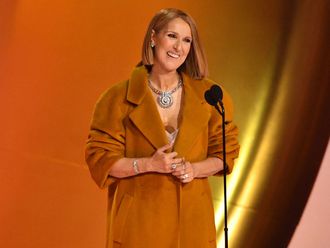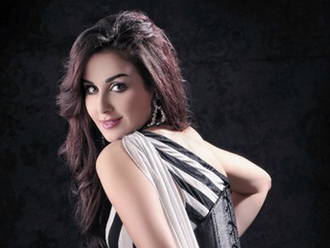
“Kim Kardashian is actually more powerful than Greece. She has more money than the whole of Greece.”
As conversational openers go, MIA beats the banal niceties of, say, “Hello, how are you doing?” as she charges straight into a chat about why her last album was considered “too confrontational for the bedroom”. It’s an icebreaker moulded to MIA’s very own design: abrasive and compelling. One sees this as she curates the annual cultural Meltdown Festival in London, which wraps up this Sunday.
“When I was a teenager in London, I would just explore the city and go to weird places,” she says. “I would never judge the place, like, ‘This is middle class and white’. This is a white country, you don’t have to spell it out to me, but there wasn’t ever a limit on where I could go or what I could do.”
A long digression on London follows, which takes in the optimistic multiculturalism of the 90s, Tamil house parties, empire and British identity. It’s the bento box of an MIA interview: individually contained ideas that don’t bleed into one another and yet, overall, make collective sense.
Given that she still looks and sounds like a beautiful, bratty, art-school upstart and is prone to labyrinthine tangents, it’s easy to portray her as inarticulate or unhinged. But MIA’s intelligence is instinctive rather than intellectual.
POLITICALLY CHARGED
Her explanation of why only the future remains relevant is food for thought. “As humans, we don’t use our past and our history to work out the importance of what our role is in the present,” she says. “And if you can’t use the past to define your present, then it should not be an element that holds back the future. Greece is a perfect example. More than Britain, they were brought to their knees, and not a single white country thought about saving them....
“Kim Kardashian is actually more powerful than Greece. She has more money than the whole of Greece,” she continues. “Therefore, that’s where the power lies… maybe what’s happening in modern society: that if you’re going to judge it by that, then other countries are gonna [sic] come in and define the future.”
We go on to consider how and where this future is being defined (for the record: “You can’t ignore the fact that China is going to be doing their thing in the next 50 years”) and how Arulpragasam believes “the immigration issue” has become a red herring covering up a truth that can explain the American and British swing to conservative populism.
“With Brexit, the idea was to get away from Europe and reinvent our identity,” she says. “And really, that identity was going to be American, but then they gave us Trump! So, everyone now is like, ‘Oh [expletive], what is Britain?’ Are we going to rewind back to the 1800s? We can’t. It’s too late for that. So, going forward, we need a charismatic leader…”
Following the UK elections, does MIA have any faith in the political system? “Everyone keeps going, ‘Corbyn can’t do this,’ but it’s, like, well, who else is there?” she says. “If people just left him alone to actually do the job and gave him some support, maybe he’d be different.”
In any case, insists the estranged daughter of a Tamil revolutionary, “politicians are people who couldn’t get jobs somewhere else.”
MIA’s politics, unwieldy and unslick though they may be, have often made her an easy target for tedious sneering in the press. Or that she is a hypocrite for making herself the poster girl for the world’s most marginalised people. And yet, she’s one of the best pop stars Britain has ever produced.
FIGHTING SPIRIT
For all the ear-clanging experimentation of her five albums, MIA has always kept a sleeve full of pop bangers — Bucky Done Gun, Paper Planes, Bad Girls, Finally — that have sounded like little that came before or since her. Even if she didn’t have the tunes, here is an art-school refugee Sri Lankan single mother with a visual aesthetic who was born into political rebellion and revels in controversy.
MIA is the best argument for when cultural appropriation works. But how much has the criticism bothered her? She says: “I just had to fight, and I still do. I just don’t care anymore.”
As it is, she says she’s most preoccupied with how to be a functioning grown up, an adult and a mother to an eight-year-old son (whose father, Benjamin Bronfman, is son to the billionaire heir of the Seagram fortune) born into immense privilege.
“When the war came to an end in Sri Lanka in 2009, it did affect me,” she explains. “Everyone was, like, ‘What does she know? She’s a pop star,’ but that was my life. It was 50 per cent of who I was, it was my identity. I didn’t know what to do with myself. So I had a kid. It’s the year the cause died, but the year my personal cause — my son — was born….”
She struggles to reconcile her upbringing — poor and living in Sri Lanka for her childhood to poor and living on a council estate in Mitcham, south London, in her adolescence — with her son’s.
“I’m not very straightforward as an immigrant. That whole, ‘My kids would never see the pain that I saw’; I’m not like that. I’m totally up for reintroducing him to the pain.” Her problems haven’t changed, she says, because of money or better circumstances. “At the beginning I thought that money could’ve saved my family. Very quickly I realised that money is not the thing.”
TAKING A STAND
She continues: “When I got into the music game, it was never an option to shut up and make lots of money. To be a huge pop star, I would have to be, like, ‘Yes, I think bombing Afghanistan was a great idea, I love our democracy and what it has achieved. I love the American flag and I’m going to make a jumpsuit out of it’. I had to do that….”
Does she worry about money now? “If you’re preaching living within your means, you have to…. But I also know that if you’re someone in society that speaks out about injustice or political issues, one of the things that happens is that you get economically punished, 100 per cent.”
The most recent example was MIA being forced to quit her headline slot at Afropunk last year, following a contentious quote in which she asked in an interview why Beyonce and Kendrick Lamar might not discuss why Muslim or Syrian lives matter.
“I don’t regret [raising the issue],” she says, with triumphant chutzpah. “You saw how bad it was. And the Muslim ban didn’t happen just with Trump, it was happening under Obama. But you couldn’t say that he introduced the Muslim ban, or banned seven different countries, or was monitoring people, or dropped more bombs than Trump has.”
In truth, Obama’s administration did identify the seven countries on Trump’s list for additional screening measures, but it didn’t bar their nationals. She’s already skipped ahead. “We’ll have to wait the four years. After eight years of Obama, we kind of knew [his failings], but we just weren’t allowed to say them because he was so great….”
She claims she doesn’t read the news anymore and that her primary sources for information are customers at the local kebab shop, taxi drivers and then “sort of figuring it out”.
After declaring her fifth album AIM to be her final one, she’s also trying to find new ways to channel her creativity. “I’m trying to write a film. I haven’t stepped into it yet because I want it to be good.”
She has, she tells me, the added complication of ADD to contend with. When was that diagnosed? “I just have it. Don’t even need diagnosis, it’s a waste of time, it’s a waste of the NHS.” In truly blithe MIA style, she adds: “It’s just when you have too many ideas and not enough ways to get them out.”













